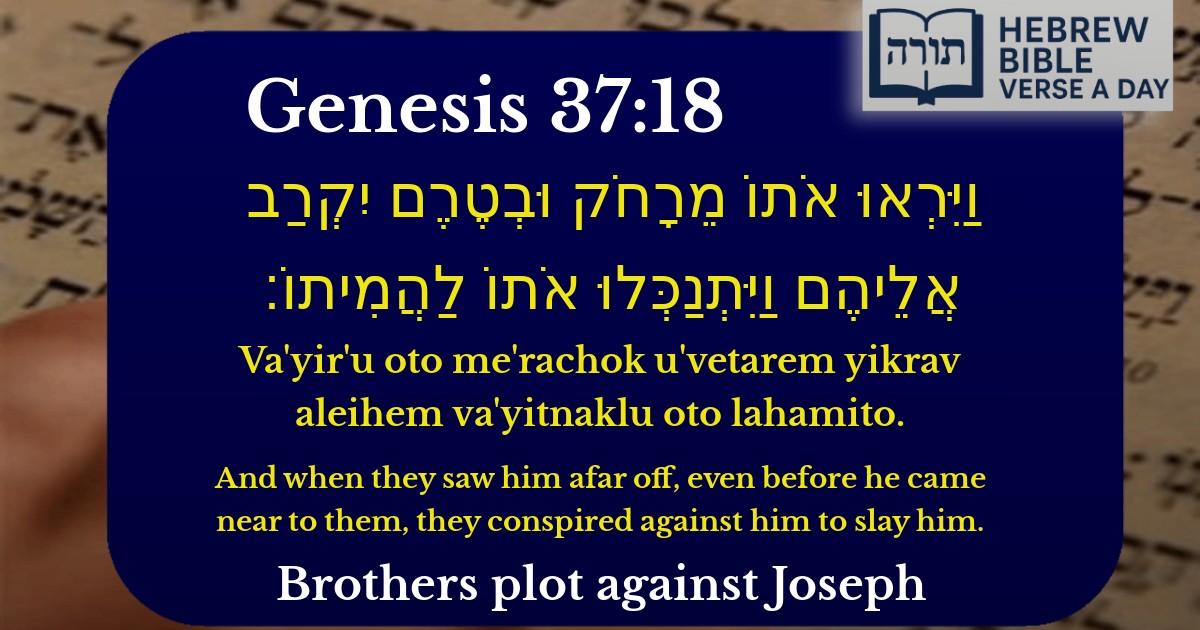Join Our Newsletter To Be Informed When New Videos Are Posted
Join the thousands of fellow Studends who rely on our videos to learn how to read the bible in Hebrew for free!
Hebrew Text
וַיִּרְאוּ אֹתוֹ מֵרָחֹק וּבְטֶרֶם יִקְרַב אֲלֵיהֶם וַיִּתְנַכְּלוּ אֹתוֹ לַהֲמִיתוֹ׃
English Translation
And when they saw him afar off, even before he came near to them, they conspired against him to slay him.
Transliteration
Va'yir'u oto me'rachok u'vetarem yikrav aleihem va'yitnaklu oto lahamito.
Hebrew Leining Text
וַיִּרְא֥וּ אֹת֖וֹ מֵרָחֹ֑ק וּבְטֶ֙רֶם֙ יִקְרַ֣ב אֲלֵיהֶ֔ם וַיִּֽתְנַכְּל֥וּ אֹת֖וֹ לַהֲמִיתֽוֹ׃
וַיִּרְא֥וּ אֹת֖וֹ מֵרָחֹ֑ק וּבְטֶ֙רֶם֙ יִקְרַ֣ב אֲלֵיהֶ֔ם וַיִּֽתְנַכְּל֥וּ אֹת֖וֹ לַהֲמִיתֽוֹ׃
🎵 Listen to leining
Parasha Commentary
📚 Talmud Citations
This verse is quoted in the Talmud.
📖 Sanhedrin 102a
The verse is referenced in the context of discussing the brothers' conspiracy against Joseph, illustrating the severity of their actions and the consequences of hatred among siblings.


Context in the Torah
This verse (Bereshit 37:18) describes the moment Yosef's brothers saw him approaching from a distance and conspired to kill him before he even reached them. This occurs after Yosef had shared his dreams of dominance over his brothers, which fueled their jealousy and hatred (Bereshit 37:5-11).
Rashi's Commentary
Rashi explains that the phrase "וַיִּתְנַכְּלוּ אֹתוֹ" ("they conspired against him") indicates they sought cunning strategies to kill him. He cites the Midrash (Bereshit Rabbah 84:15) that they debated whether to kill him directly or indirectly—such as throwing him into a pit where wild animals might devour him—to avoid direct bloodshed.
Ibn Ezra's Insight
Ibn Ezra notes that the brothers' immediate hostility upon seeing Yosef from afar demonstrates how deeply their resentment had taken root. Their hatred was so intense that they did not wait to hear his words or intentions before plotting his death.
Midrashic Interpretation
The Midrash Tanchuma (Vayeshev 4) elaborates that the brothers' conspiracy was not merely impulsive but a calculated decision. They reasoned that Yosef's dreams threatened the future of the tribes of Israel, and they saw his elimination as a necessary measure to preserve the family's unity under Yaakov's leadership.
Rambam's Ethical Perspective
Rambam (Hilchot De'ot 2:6) uses this episode as a cautionary lesson about the dangers of unchecked hatred and jealousy. The brothers' inability to reconcile with Yosef's favoritism led them to irrational violence, emphasizing the Torah's warning against letting emotions override justice (Vayikra 19:17).
Key Lessons from the Verse